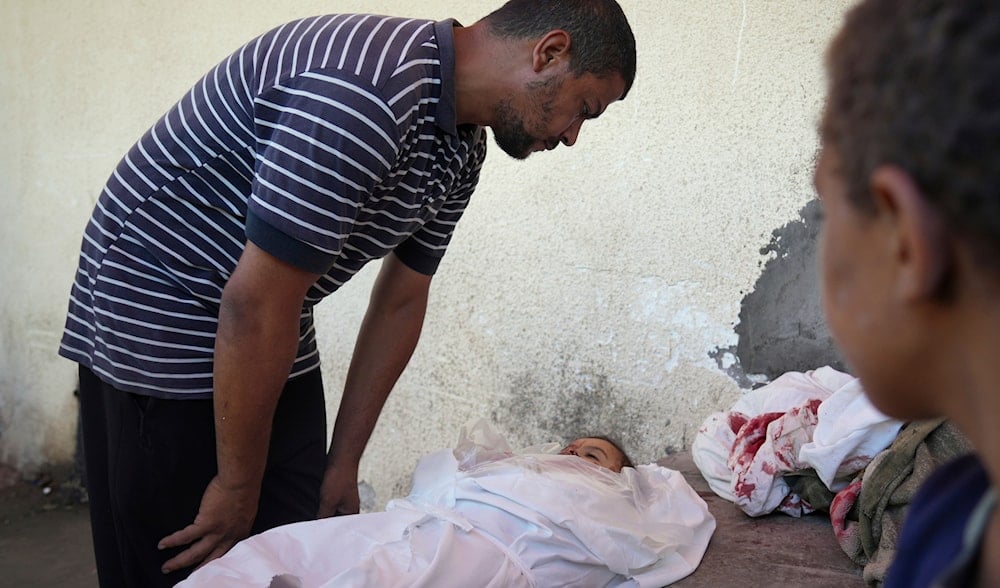WFP reviews BCG ties after Gaza aid role sparks outrage: FT
The World Food Programme says it was unaware of BCG’s involvement in a Gaza aid initiative tied to controversial displacement modeling and deadly aid center incidents.
-

Omar Meshmesh looks at the body of his 3-year-old niece Aya, who was among 10 people, including two women and five children, killed in an Israeli strike while waiting to receive nutritional supplements at a Project Hope-run medical clinic in Deir al-Balah, Gaza Strip, on July 10, 2025. (AP Photo/Abdel Kareem Hana)
The World Food Programme (WFP) has initiated a comprehensive review of its partnership with Boston Consulting Group (BCG) following public backlash over the firm’s undisclosed role in a controversial aid initiative linked to Gaza.
The decision comes after the Financial Times (FT) revealed that BCG contributed to modeling the financial implications of relocating Palestinians from Gaza and supported the establishment of the Gaza Humanitarian Foundation (GHF), an "Israel"- and US-backed body tasked with distributing aid in the war-ravaged enclave.
GHF has drawn widespread criticism from humanitarian organizations and UN officials, particularly after reports emerged that hundreds of Palestinians were killed while attempting to access its aid distribution hubs.
WFP cites 'shock and grave concerns' over BCG’s undisclosed role
The WFP, which has worked with BCG since 2003, said it did not know of the firm’s involvement in GHF until the media disclosures. In a statement to the FT, the agency expressed "shock and grave concerns," condemning BCG’s "lack of transparency in not having informed us."
"WFP is emphatic that the work of its partners aligns with our core values, mission, and policies," the agency said, adding, "Given these recent revelations, WFP has begun a comprehensive review of its work with BCG."
In its response, BCG claimed that two partners involved in the Gaza-related work acted without proper authorization and were terminated in June.
The controversy surrounding BCG is part of a larger wave of criticism of GHF, which has been described by the United Nations as a "fig leaf" for "Israel’s" ongoing genocide. Numerous humanitarian organizations have refused to cooperate with GHF, citing concerns over its operational model and the safety of civilians attempting to access aid.
According to the UN, more than 800 Palestinians have been killed while trying to reach GHF-operated centers, which are heavily guarded by Israeli forces and US private contractors.
The UK Parliament’s International Development Committee has requested that BCG clarify its activities in Gaza. Meanwhile, Save the Children suspended its partnership with the firm on June 13, shortly after BCG confirmed its involvement with GHF.
Financial modeling and displacement planning spark alarm
Further controversy erupted after the FT reported that BCG had contributed to a financial reconstruction plan for Gaza. That plan reportedly included cost estimates for the "voluntary relocation" of hundreds of thousands of Palestinians, an aspect that has drawn widespread condemnation as a potential blueprint for forced displacement.
While BCG has pledged to forgo the $4 million it had planned to bill for its work with GHF, critics remain skeptical. Observers have pointed to the broader ethical implications of private firms shaping post-war reconstruction agendas in war zones, particularly without full transparency.
Launched in May, the GHF reportedly oversees four aid distribution hubs in Gaza, while the enclave remains devastated by nearly two years of Israeli bombardment. The United Nations has warned that the entire population of 2.1 million is at imminent risk of famine, according to the FT.

 3 Min Read
3 Min Read








